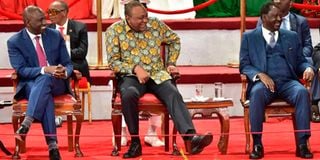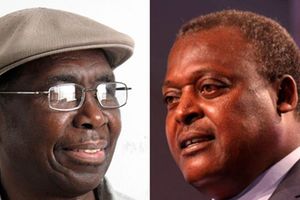Premium
Ruto, not Raila, is best placed to secure Uhuru’s interests

President Uhuru Kenyatta (centre), Deputy President William Ruto (left) and ODM leader Raila Odinga at the Bomas of Kenya during the launch of the BBI report.
What you need to know:
- Will Raila have the incentive to repay Uhuru? The answer to this is No.
- Uhuru will have gone home and Baba will be in State House with all the trappings of power.
Unlike Mwai Kibaki in 2013, President Uhuru Kenyatta has publicly endorsed Raila Odinga as his preferred successor. President Kenyatta has rendered idealistic and moral reasons why he made the choice. They include his desire to break the two-tribe political hegemony in Kenya.
This article is not intended to discuss the merits and demerits of that endorsement from an idealistic angle. Rather, it approaches the discussion from a rational, realist and pragmatic angle. It seeks to answer the question: who between Raila and Ruto would best secure Uhuru's post-presidency interests?
These interests are not necessarily nefarious. They may include legitimate and moral concerns of ensuring the new administration retains top civil servants he hired.
Assumptions of either a Raila or Ruto win will be made. These are the two leading presidential candidates as per various credible opinion polls.
The article's intention is to apply political methods to assess risks and model matters of uncertainty.
If Raila were to win, it is expected he would be indebted to Uhuru and thus be best placed to protect Uhuru's interests. He would have achieved that which he has unsuccessfully attempted four times largely by dint of strong support from Uhuru. However, this conclusion may not necessarily be true. It is based on Raila acting magnanimously and altruistically.
No incentive to repay Uhuru
But politics is never predicated on the goodness of men. The best way to inquire this is: will Raila have the incentive to repay Uhuru? The answer to this is No. First, the power relationship between the two will change in favour of Raila.Uhuru will have gone home and Baba will be in State House with all the trappings of power.
Second, unless something drastic happens, Uhuru's political base of Mt Kenya will have largely voted for Ruto. Uhuru will thus face Baba having brought onto the winning table insignificant votes. That in itself would form a strong basis upon which Baba may be disincentivised to repay any political debt.
Third, Raila’s first weeks in government would be spent consolidating government. This includes undertaking Cabinet nominations for vetting by the National Assembly. Often, the philosophy behind this process is underpinned by two conflicting rationales. On the one hand, Raila might be minded to appease his political enemies. This means appointing into government persons from communities that voted against him. On the other hand, Raila can be minded to reward loyalty and lean towards his traditional support bases. With an eye on the 2027 elections, Raila would most likely opt for the second rationale.
This is because rewarding loyalty is moving from the 'known'. Further, for a person who has struggled so much for the seat, the moral push to reward his loyal lieutenants who have stood by him since 1997 as opposed to appeasing his enemies would be too great to ignore.
Doing the reverse would be very risky as there is no guarantee that the appeasement strategy will work. In such a scenario, Raila would have no incentive to repay Uhuru for the good work he would have done ,if indeed there is expectation of reciprocation .
There have been suggestions that Uhuru can 'insure' his deal with Raila. One way is by signing a legally binding coalition agreement. This explains the new changes to the Political Parties Act. However, political agreements should be political – not legal– agreements. It is very difficult to enforce political commitments using the law. In 2002, Kibaki and Raila made legal commitments on sharing government.
Greatest voting bloc
In 2013, Mudavadi and Uhuru signed a legal commitment where the latter would drop his presidential bid in favour of the former.
In 2017, Kalonzo and Raila entered into an agreement where Raila would support Kalonzo in 2022 irrespective of the 2017 poll results. All these were breached and no party made an attempt to legally enforce these commitments.
The best way to enforce a political agreement is to politicise the commitment and carry the public along. If either party breaches the agreement, the public can cause its enforcement. A good example is Uhuru’s public commitment of "Yangu Kumi ya Ruto Kumi". This explains why many Kikuyus are stuck with that commitment since it was done in public.
The second form of insurance would be Uhuru ensuring most parliamentarians in Azimio enter Parliament through the Jubilee side. If Uhuru controls Parliament, he can hedge against a Raila breach. However, it is settled in Kenya that most parliamentarians switch allegiance to a reigning president after elections. This process will escalate further because Uhuru is not expected to bounce back into power.
If Ruto wins, Mt Kenya will form his greatest voting bloc, much larger than his native Rift Valley. With an eye on 2027, Ruto would want to retain the bloc for his future political battles. He would therefore have to mollify Uhuru because he remains a son of Mt Kenya. If Ruto makes any attempt to antagonise a retired Uhuru, the public mood in Mt Kenya can turn against his presidency.
Therefore, the irony of this contest is that Ruto might be better for Uhuru than Raila post-August 2022.
Dr Irungu Kang’ata is the Senator of Murang’a County.





